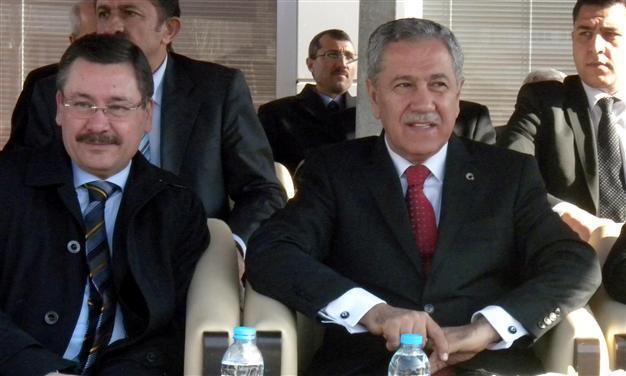Turkey's Deputy PM decides 'not to destroy Ankara Mayor politically'
ISTANBUL

Ankara Mayor Melih Gökçek, L, and Deputy Prime Minister Bülent Arınç
Turkey's Deputy Prime Minister Bülent Arınç has said that he decided not to "destroy" Ankara Mayor Melih Gökçek politically, as "it is not necessary anymore."The two heavyweights of the Justice and Development Party (AKP) had engaged in a damaging intra-government clash in March, when Gökçek accused Arınç of "sitting in the lap of the parallel state," referring to the U.S.-based Islamic cleric Fethullah Gülen-led movement that has been targeted by the government since the huge graft probe broke late in 2013.
Arınç, who had then fired back by accusing Gökçek of corruption and "selling Ankara to this structure plot by plot," said on June 13 in a live interview with private broadcaster CNNTürk that he decided to stay silent.
Changing his decision to speak out after the June 7 parliamentary elections, Arınç told the broadcaster that it was "not necessary anymore."
"I had considered to destroy [Gökçek] politically as he was trying to ingratiate himself with certain people," Arınç said, stressing that he decided not to do it after the AKP lost its single party majority in the parliament.
"Elections results are an important indicator. One of the analytical reasons [for AKP's decline] could be what happened in the municipalities and the performance of mayors," he added.
Referring to recent newspaper reports that allegedly showed how Gökçek allocated plots of land to Gülenists, Arınç also revealed that he did not vote for the AKP's mayoral candidate in the March 30, 2014, local elections.
"I knew it," Gökçek's main rival in last year's election race tweeted with a smiley, moments after Arınç's revelation.
:))) Biliyordum.. https://t.co/EXh92lTwi0
— Mansur Yavaş (@mansuryavas06) June 13, 2015When asked whether the electorate had tried to teach the AKP a lesson, Arınç said: "They warned us. They said: 'We are not happy about everything you do'. And in the democratic systems, you [parties] should look in the mirror ... "[Election] results did not authorize us to prepare a new constitution. The other parties have not showed a demand for it, as well."
















